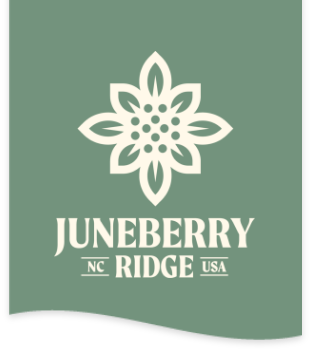What if the food we eat could strengthen the bonds within our communities?
At the second fireside chat at Juneberry Jams, we explored how local food systems and collaboration are not only essential to agriculture but also key to fostering a stronger sense of community. Watch the full fireside chat below.
A little less ‘me’ and a lot more ‘we’.
On June 8th, 2024 at 5:15 PM, Ashton, our Chief Operating Officer, introduced Roger Dick, President and Chief Executive Officer of Uwharrie Bank, as our second fireside chat guest speaker of our three-weekend long Juneberry Jams festival.
Roger began by sharing his perspective on community: it’s not just a space where people live, but a place where people are cooperating and genuinely care for one another. In a world that often focuses on individual success, Roger invited the audience to think differently—putting community and collective well-being at the center of everything we do.
“We are at our best and most powerful when we cooperate with one another,” he emphasized, setting the stage for a conversation about how collaboration, rather than competition, is the path forward.
Collaboration, not competition.
Success is often seen through a lens of competition—a “survival of the fittest” mindset. But lasting success comes when we work together, creating environments where everyone can thrive. Whether in business or in daily life, collaboration lets us combine resources, share knowledge, and tackle challenges together. This doesn’t just lead to better solutions; it helps build stronger, more connected communities where people feel valued and supported.
Communities that prioritize collaboration over competition are also more resilient and adaptable. They can weather challenges because their strength lies in their connections. When neighbors help each other, when local businesses support one another, and when volunteers come together to address community needs, everyone benefits. Collaboration amplifies the impact of each individual effort, making the whole greater than the sum of its parts.
Each small act of cooperation creates ripple effects that strengthen the entire community, making it a more vibrant, supportive, and thriving place to live. True success isn’t about standing alone at the top—it’s about rising together, creating a future where everyone has the chance to succeed.
Communities as ecosystems.
Think of human communities like ecosystems. Just as plants, animals, and the environment rely on one another to thrive, people depend on their relationships and connections to create a healthy, thriving community. In nature, each element—whether it’s the soil providing nutrients for plants or animals enriching the soil through grazing and fertilization—plays a vital role in supporting the whole. The same goes for people, when we nurture our relationships and work together, the entire community benefits.
Ashton echoed Aldo Leopold’s “land ethic,” which emphasizes the deep interconnectedness between people, land, water, plants, and animals. Leopold believed that just like every part of nature is intertwined, human communities are also closely tied to the land and each other. In regenerative farming, this connection is clear—success depends on the relationships between soil, crops, livestock, and farmers. The soil’s health impacts the crops, which in turn feed the animals and people, creating a cycle of mutual support. If any part of this system is neglected or pushed too hard, the entire ecosystem starts to break down.
The same concept applies to human communities. If we neglect the relationships that connect us—whether with neighbors, local businesses, or the land itself—our community weakens. However, when we invest time, energy, and care into these connections, we create a web of support that strengthens everyone. By working together, nurturing each other, and respecting the environment around us, we can create thriving communities which are resilient, vibrant, and sustainable for generations to come.
Local bites, better lives.
“The biggest contributor to your health and well-being is your diet. If we really want to build community, we need to start with local foods,” Roger explained. But what we eat doesn’t just impact us personally—it affects our entire community. When we choose to eat local, we’re not only looking after ourselves, but we’re also helping the people, farms, and businesses right around us. It’s all connected.
This idea connects so well with Michael Shuman’s “25% shift” concept. He suggests that if we spent just 25% of our budget at local businesses, it could have a huge impact. Imagine what would happen if we applied that thinking to our food choices. By spending just a quarter of our grocery budget on local produce, meats, and other goods, we’d not only nourish our bodies with fresh, healthy foods, but we’d also improve the wealth of our community, create jobs, and support local farmers.
There’s another simple truth we might all agree on: relationships are worth a lot more than money. When you buy local, especially food, you’re building connections with the people who grow and produce it. You get to know where your food comes from, how it’s made, and even the land it’s grown on. There’s something powerful about that connection—it gives more meaning to food you eat, and more quality to the relationships you keep.
Keeping wealth in the community.
While the benefits of local food systems and community collaboration are clear, globalization brings its own set of challenges. Big corporations often take money out of rural areas, leaving behind uncertainty and fewer opportunities. Instead of focusing on boosting corporate profits, Roger highlighted that we need to think about what really benefits people and their communities.
“If you have a business that is local, and the profits stay in the local community, the wealth goes up,” Roger emphasized. When we invest in small farms, local shops, and community-focused businesses, we keep the wealth right where it belongs—fueling local jobs and building stronger communities. But it’s not just about the money—it’s about the relationships and shared purpose that are built when we prioritize community over corporate profit.
Roger highlighted the importance of purpose-driven businesses that invest in their communities rather than focusing solely on profit. “When a society prioritizes human well-being over profitability, we start to see the true purpose of business: to serve the community,” Roger said.
Under Roger’s leadership, Uwharrie Bank has fully embraced this philosophy by actively investing in the local community. The bank supports a wide range of initiatives that go beyond typical business goals, including over $7.5 million in charitable giving to 300 civic and nonprofits within Stanly county, including groups such as GHA Autism Supports, Pfeifer University, and the Stanly Adult Care Center. By prioritizing community-centered growth, Uwharrie Bank demonstrates that businesses can thrive while putting people first, creating a win-win for both the company and the community it serves.
In summary, Roger shared how local food systems and community collaboration are essential to building stronger, and more resilient communities.
- Community thrives on collaboration, not competition. When we work together instead of competing, we create stronger, more vibrant communities. True success comes from lifting each other up.
- Human communities are like ecosystems. Just as regenerative farming depends on the relationships between soil, crops, and farmers, human communities flourish when we nurture our connections and work toward shared goals.
- Our diet is deeply tied to our well-being and community. The food we choose to eat not only impacts our health but also strengthens our connection to the land and local farmers. Supporting local food systems builds healthier, more resilient communities.
- Local businesses keep wealth in the community. Investing in small, local businesses and farms ensures that profits stay local, fueling jobs and boosting the local economy while fostering a sense of shared purpose.
From our conversation, it’s clear that local food systems and community collaboration are deeply connected to the well-being of our communities. By shifting our focus toward supporting local businesses, embracing collaboration over competition, investing in small farms, and strengthening our relationships with the land and each other, we can create healthier, more resilient communities. Each small step we take—whether it’s choosing local food or prioritizing community-driven initiatives—moves us toward building a brighter, more sustainable future for all.
About Juneberry Jams
Juneberry Jams is an annual summer festival celebrating regenerative agriculture, great music, and farm-fresh food in Stanly County, North Carolina. The festival is hosted by Juneberry Ridge, a 750 acre farm, education center and events destination in Norwood NC. There’s no better place to build community and learn about soil health, local food, and holistic farm management than the local farms forging the path for healthier agriculture.
Juneberry Jams was made possible by title sponsor and community partner, Uwharrie Bank as well as Kinetic by Windstream, and Visit Stanly. Community sponsors also included local business leaders, Stokes Construction, Precision Mechanical, and Uwharrie Technology. Music programming was produced in partnership with Charlotte-based non-profit, Tosco Music.
About Roger Dick
Roger Dick is a native of Stanly County and is president and chief executive officer of Uwharrie Capital Corp, holding company for Uwharrie Bank and Uwharrie Investment Advisors. He is a graduate of Appalachian State University and received a Master of Business Administration, concentrating in finance, from UNC-Charlotte. Roger led the development of Uwharrie Bank (formerly Bank of Stanly) in 1983 and has been instrumental in its success ever since.



